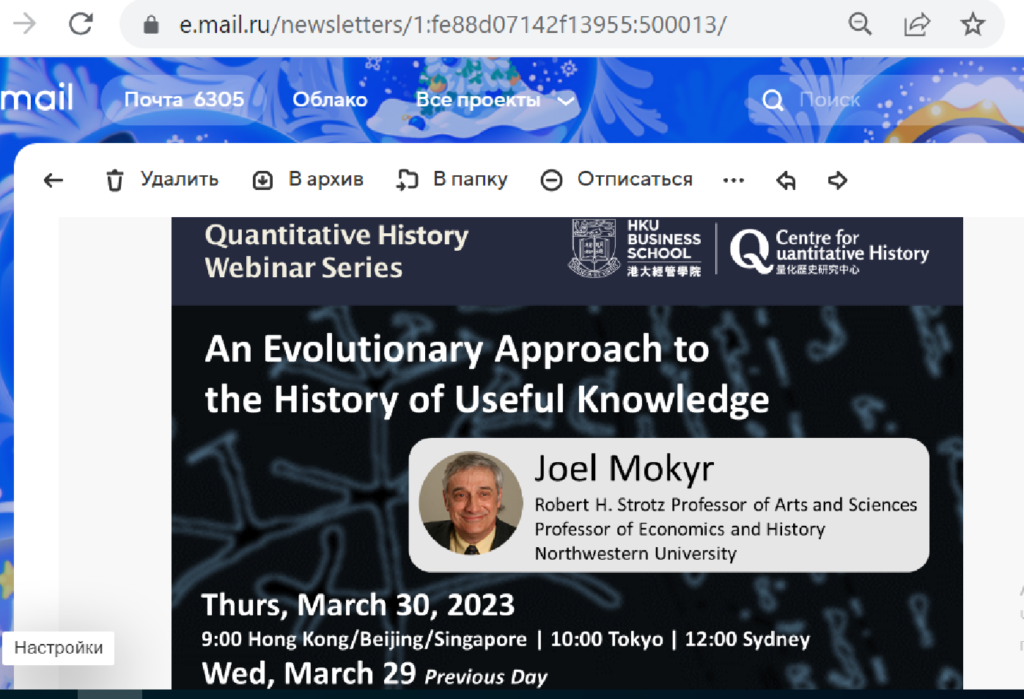Approches on Economic history.
An Evolutionary Approach to the History of Useful Knowledge by Joel Mokyr (Northwestern).

Quantitative History Webinar Series.
| View this email in your browserRegister NowJoin us for this week’s webinar on An Evolutionary Approach to the History of Useful Knowledgeby Joel MokyrLive on Zoom on Thursday, March 30, 2023 9:00 Hong Kong/Beijing/Singapore | 10:00 Tokyo | 12:00 Sydney Wednesday, March 29 (Previous Day) 18:00 Los Angeles | 21:00 New York Convert this into your local time How should we think about long-term economic progress? Something dramatic changed in Europe in the centuries before the Industrial Revolution, but our models have difficulty identifying the precise nature of what was driving the change. In this Quantitative History Webinar, Joel Mokyr of Northwestern University will present his argument that models inspired by Charles Darwin can help us understand the selection process that committed the most important agents in Europe to a culture of progress which we associate with the Industrial Enlightenment and eventually to sustainable economic growth. The great advantage of evolutionary thinking is that it tries to explain why the present is the way it is and not some other (possible) way and that unintended consequences and emergent properties are a key to understanding long-term economic history. Discussant: Jared Rubin, Professor of Economics, Chapman University Looking forward, Quantitative History Webinar Series Conveners: Zhiwu Chen & Chicheng MaQuantitative History • An Area of ExcellenceCopyright@2023. Quantitative History Webinar Series. Centre for Quantitative History and International Society for Quantitative History. All Rights Reserved. The Quantitative History Webinar Series is substantially supported by the Areas of Excellence (AoE) Scheme from the Research Grants Council of the Hong Kong Special Administrative Region, China (Project No. [AoE/B-704/22-R]). Our mailing addresses are: cqhmail@hku.hk quantitativehistory@gmail.com You can update your preferences or unsubscribe. |
Комм.: Представьте, что Вы фермер, снабжающий город продуктами питания. И чем, дальше от города находится Ваша ферма, тем выше издержки. К.Маркс исходил из того, что фермер арендует землю и тогда арендодатель стремился сократить сроки аренды, а арендатор , наоборот, продлить, т.е.сделать аренду долгосрочной! Так происходила самоорганизация экономич.отношений. Говоря по-русски, постепенно устаканивалось. В частности, если латифундист владел разными по качеству, плодородию участками земли , то сдача в аренду оных шла по разной цене. И это тоже считал немецкий экономист, занимаясь в библиотеке Британского музей.
Но вот у человека, еще до этого, как появились товары -предметы и иные объекты, которые имели непревзойденное значение и, тогда, не считаясь ни с какими затратами, неся при этом большие потери, человек «доставал»их. Такова концепция, если популярно,получила название Long trade distance , отмеченная в статье Оксфордской энциклопедии Экономич.истории. Что важно, при наличии исходных данных, где казалось бы существ.явления и процессы могли быть описаны данной концепцией — она работала не везде. Она работала в Африке и, в частности выдающий англ.путешественник Дж.Ливингстон невольно стал субъектом данной концепции, но не работала в Андах. Сейчас же заметим, что в Москве арендодатель квартир требует плату за наем жилья больше,там, где квартиры у метро, а агрегатор такси взимают плату больше если ездишь по центру столицы, или едешь туда в центр, т.к.есть риск «нарваться» на «пробку.» Стоит прикинуть: где давно известные рентные отношения, а где риск-менеджмент.
Other posts
Twt- 270323 «Last posts
- О ТВЕРСКИХ КЛАДАХ КУФИЕЧКИХ МОНЕТ 9-10 ВВ. К проблеме распространения арабской монеты в Европе.Другое название:К ВОПРОСУ О ФОРМИРОВАНИИ И ДВИЖЕНИИ МОНЕТНЫХ ПОТКОВ В СРЕДНЕВЕКОВЬЕ (МЕТОДОЛГО-ТЕОРИЧЕСКОЕ ОБОСНОВАНИЕ).
- X 141124
- X 1311224
- X 12112
- X 11.11.24
- X 101124 1\3
- X 091124
- Quantitative History Webinar today morning.
- X 071124
- X 061124
Comments
So empty here ... leave a comment!